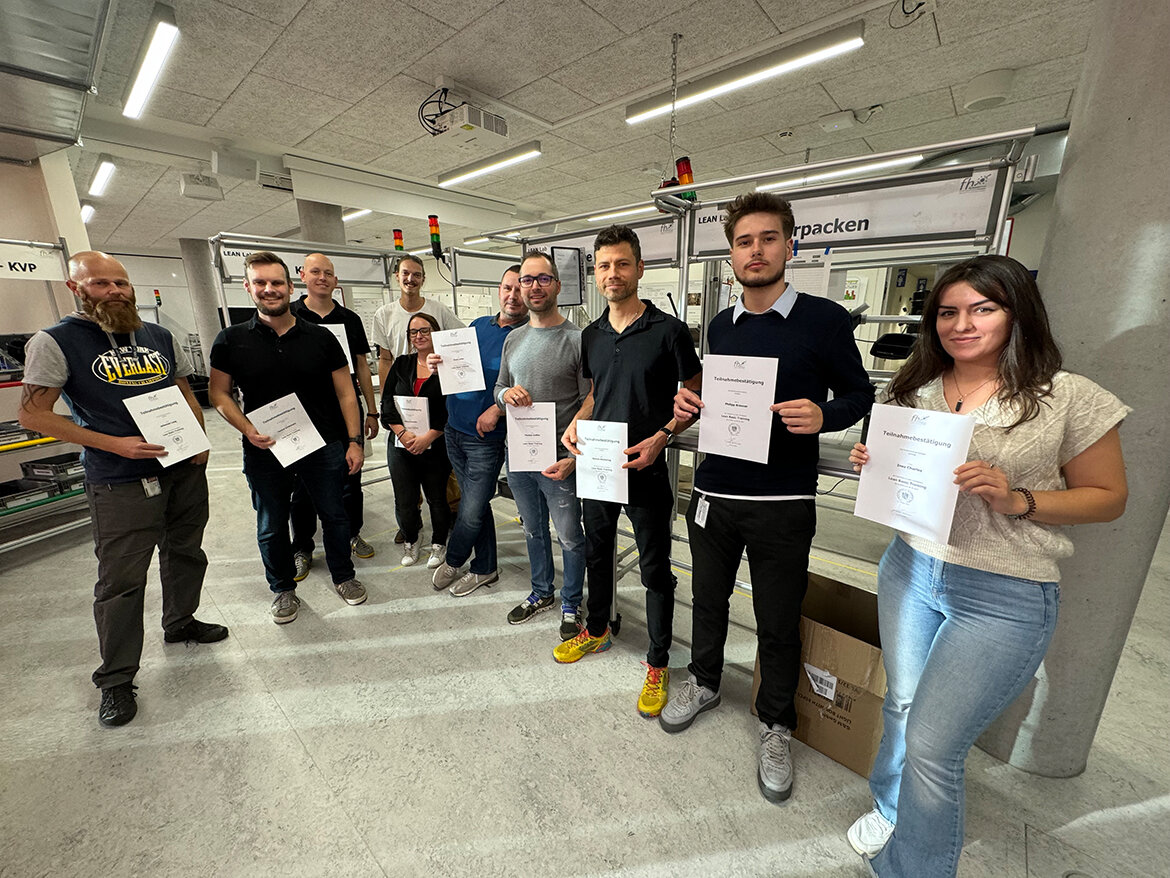LEAN LAB: Successful training for Liebherr employees
- 09.12.2024
- News Study Program

Employees of the Liebherr plant in Telfs after the lean basic training in the LEAN Lab at the University of Applied Sciences Kufstein Tirol.
How can production be made even more efficient? Employees of the Liebherr plant in Telfs have learned how to successfully implement lean management in a practical way at the LEAN Lab of the FH Kufstein Tirol. The targeted training courses help to further increase efficiency at the plant.
Efficient production and continuous process optimization are central pillars for the success of a company. This philosophy has been consistently pursued at the Liebherr plant in Telfs for years. Under the leadership of CEO Managing Director Alfred Weithaler, the company has not only introduced the principles of lean management, but has also continuously developed them to make the production process even more efficient.
TRAINING IN THE LEAN LAB AS KEY TO SUCCESS
An important part of this continuous improvement is the training of employees in the LEAN Lab at the University of Applied Sciences Kufstein Tirol. More than 20 employees from various departments of the Liebherr plant in Telfs took part in intensive training this year to further develop their knowledge of lean management. In the practice-oriented training sessions led by Prof. (FH) Dr. Martin Adam and Guido von Rohr, the participants learned techniques for workplace optimization, error prevention, flow production, and implementing visual management.
“Liebherr Telfs has been relying on lean management for a long time, and the management itself, in particular site manager Alfred Weithaler and his department heads, strongly support the lean activities,” explains Prof. Adam. This top-down implementation of lean principles ensures that the learning content can be transferred directly into practice and immediately integrated into the daily work routine.
CONCRETE RESULTS AND IMPROVEMENTS
The training in the LEAN Lab not only provides employees with theoretical knowledge, but also with practical tools that they can apply directly in their work environment. Participants indicated that they now make greater use of tools to avoid errors, find illustrated work instructions more effective, and recognize the importance of short communication channels and standardization.
These measures help to further increase efficiency in the plant, although concrete measurable successes such as productivity increases are not yet apparent immediately after the training. However, the long-term effect of this training is clear: through the combination of practical training and management support, employees are well equipped to successfully implement lean principles in their daily work environment.
LONG-TERM PARTNERSHIP
The LEAN Lab at the Kufstein University of Applied Sciences is not just a one-off initiative. A few years ago, the LEAN Lab was set up for several weeks at the Liebherr plant in Telfs. “We have had a long-standing relationship with Liebherr, not only through the lean training courses, but also through best practice visits and the involvement of students and graduates,” explains Prof. Adam. The partnership between the FH Kufstein Tirol and Liebherr is based on continuous exchange and the joint promotion of best practices.
There are currently no specific plans for further training or joint projects, but the successful collaboration shows how continuous development in production can be achieved through practice-oriented training and partnership-based exchange.
